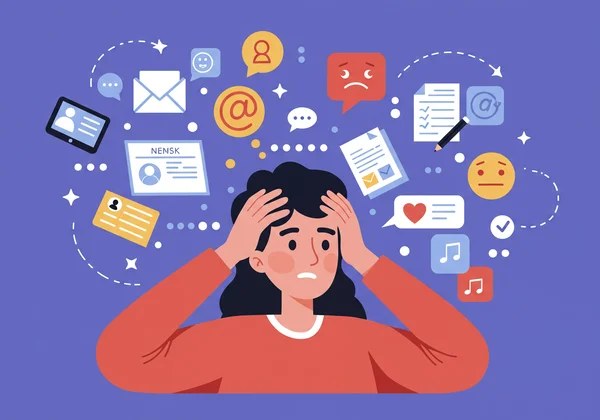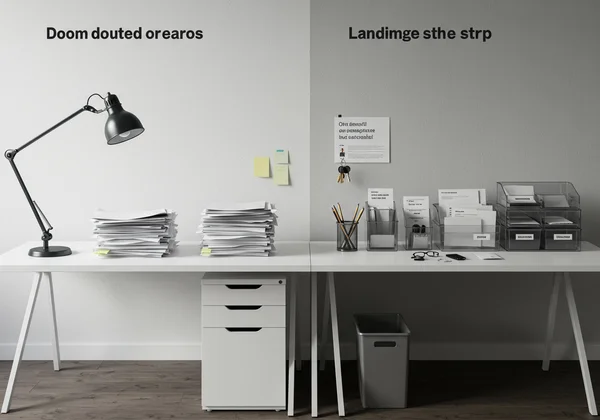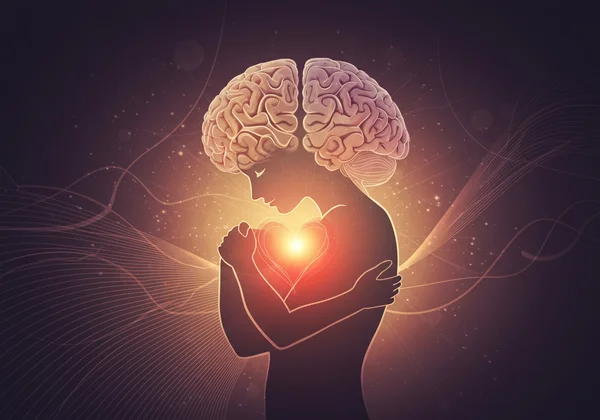大人の ADHD:日常生活で役立つ10の実践的な対処法
常に山積みのタスクに圧倒され、思考が散漫になって脱線したり、激しい感情の管理に苦労していませんか? あなたは一人ではありません。ADHD の特性を持つ多くの大人が、日々まさにこれらの課題に直面しています。しかし、もしあなたがもっと楽に、自信を持って一日を過ごせるとしたらどうでしょう? その旅は、あなたのユニークな脳の配線を理解することから始まります。 私は ADHD なのでしょうか? この問いに答えることは、力強い最初の一歩であり、このガイドでは、あなたがうまくやっていくための、医学的治療に頼らない10の実践的な戦略を提供します。これらの ADHD 対処法は、自分の特性を探り始めたばかりの人も、新しい管理方法を探している人も、力を与えられるように設計されています。
あなた自身の課題を理解することが鍵です。良い出発点となるのは、体系的な自己評価です。一般的な特性を示しているかどうかをよりよく理解するために、パーソナライズされた洞察を得るために 無料の ADHD テスト を受けてみることを検討してください。

大人の ADHD で時間とタスクをマスターする
ADHD の大人にとって最も一般的な不満の一つは、時間管理、整理整頓、生産性との絶え間ない闘いです。まるでハムスターの回し車の上を走っているように、忙しいのにどこにも進んでいないと感じることがよくあります。次のテクニックは、あなたの脳に逆らうのではなく、脳と 共に 働くのに役立つように設計されており、日常生活で役立つ ADHD の管理方法 スキルを提供します。
先延ばしを克服する:「ボディ・ダブリング」の力
先延ばしは怠惰の兆候ではありません。ADHD の人にとっては、圧倒されたり、刺激が不足したりすることへの反応であることがよくあります。 ボディ・ダブリング (他者の存在下で作業する)は、シンプルでありながら非常に効果的な戦略です。これは、他の人の存在下で、静かに、あるいは協力しながらタスクに取り組むことを含みます。この人はアンカーとして機能し、微妙な社会的プレッシャーを生み出し、集中力とタスクへの取り組みを維持するのに役立ちます。彼らが同じ作業をしている必要さえありません。彼らの静かな存在が、あなたの脳を活動的に保つのに十分です。
「破滅の山」を飼いならす:ADHD のためのシンプルな整理術ハック
増え続ける郵便物、洗濯物、書類の山(しばしば「気が重くなる物の山」、通称「ドゥームパイル」)は、大きな不安の原因となり得ます。完璧な整理整頓を目指すのではなく、機能的なシステムに焦点を当てましょう。異なるカテゴリには透明な収納ケースを使用し、鍵や郵便物用にドアのそばに指定の「着陸帯」を作り、「ワンタッチ」ルールを導入しましょう。つまり、2分未満で完了するタスクは、後回しにせずにすぐに実行するのです。これらのシンプルな 整理術ハック は、視覚的な散らかりと精神的な負担を軽減します。

目的を持って優先順位を付ける:タスクのグルーピングと時間ブロック化のテクニック
ADHD の人は、異なる種類のタスク間で切り替えるのが難しいと感じることがよくあります。これは精神的エネルギーを消耗するプロセスです。 タスクのグルーピング は、類似の活動をまとめて行うことを含みます。例えば、すべてのメールに一度に返信したり、すべての用事を一度の外出で済ませたりすることです。 時間ブロック化 はその完璧なパートナーです。これらのバッチをカレンダーの特定のブロックにスケジュールします。これにより、一日の明確なロードマップが作成され、意思決定の疲労が軽減され、タスクを開始しやすくなります。
ADHD の脳のための集中力向上と注意散漫の最小化
通知、騒音、頭の中の考え事に満ちた世界で集中力を維持することは、不可能に感じられるかもしれません。これらの 大人の ADHD のヒント は、集中力をサポートし、脳の自然な注意のリズムを活用する環境を作ることに焦点を当てています。これらの戦略に取り組む前に、オンライン ADHD スクリーニング を通じて、あなたの特定の集中力の課題を理解することが、貴重な背景情報となるでしょう。
環境を最適化する:感覚刺激に配慮した空間を作る
あなたの周囲の環境は、集中力に大きな影響を与えます。ADHD に優しい環境とは、不要な注意散漫を最小限に抑えつつ、適切な量の刺激を提供する環境です。ある人にとっては、ノイズキャンセリングヘッドホンとミニマリストな机を意味します。またある人にとっては、静かなインストゥルメンタル音楽を流したり、手元にフィジェットツールを置いたりすることを意味するかもしれません。何があなたの脳を落ち着かせ、仕事の準備を整えさせるのか、実験して見つけてください。 感覚刺激に配慮した 作業空間を作ることは、状況を一変させます。

マインドフルな休憩と過集中を生産性に活用する
脳の休憩の必要性と戦うのではなく、意図的に休憩をスケジュールしましょう。ポモドーロ・テクニック(25分間の集中作業と5分間の休憩を繰り返す)は、これに最適です。休憩中は、立ち上がってストレッチをしたり、全く別のことをして注意をリセットしましょう。一方で、ADHD の人が興味のある活動に没頭したときに起こる、 過集中 と呼ばれる強烈な集中状態を認識し、活用することを学びましょう。それが起こったら、その波に乗りつつも、他の重要な責任を怠らないようにアラームを設定してください。
ADHD と共に感情をナビゲートし、自己への思いやりを育む
ADHD は注意力だけの問題ではありません。それは感情の調整に深く影響します。ADHD の多くの大人は、より強い強度で感情を経験し、欲求不満、興奮、失望の管理に困難を抱えています。これは、しばしば認識されない経験の中核的な部分です。
感情調節困難を理解する:積極的な対処法
感情調節困難 とは、状況に不釣り合いに感じられる、急速で激しい感情的反応を指します。最初のステップは、これを個人的な失敗ではなく、神経学的な特性として認識することです。積極的な戦略には、感情が湧き上がったときに気づくためのマインドフルネスの実践、個人的なトリガーの特定、そして圧倒されたときに短い散歩をしたり深呼吸をしたりするなどの「一時停止計画」を立てることが含まれます。これにより、思考する脳が感情を感じる脳に追いつく機会が与えられます。
あなたの神経多様性を受け入れる:ADHD の自己への優しさを実践する
ADHD と共に生きることは、しばしば自己批判の長い歴史を伴います。その物語を再構築する時です。自己への思いやりを実践するとは、友人に接するのと同じ優しさで自分自身に接することを意味します。判断せずに自分の課題を認め、小さな勝利を祝いましょう。自分の脳が欠陥があるのではなく、単に異なっていると認識することは、精神的な幸福の基礎です。あなたの 神経多様性 (脳の機能や特性の違い)を受け入れることは、自己肯定の行為です。自分の神経タイプについて疑問に思っているなら、秘密厳守の ADHD テスト が洞察に満ちた最初の一歩となるでしょう。

ADHD の成功のためのサポートシステムとルーティンを構築する
意志力だけに頼るのは疲弊します。最も成功する ADHD のための生活の工夫 は、実行機能(計画、整理、記憶を担当する脳の管理システム)をサポートする外部システムを作成することを含みます。それはあなたの脳のための足場を構築するようなものだと考えてください。
思考を外部化する力:効果的なルーティン
あなたのワーキングメモリは信頼できないことがあるので、それに頼りすぎないでください。 思考を外部化する とは、思考、リマインダー、計画を頭の中から取り出し、信頼できる外部システムに入れることを意味します。これは、物理的な手帳、デジタルカレンダー、またはキッチンのホワイトボードかもしれません。一貫した朝と夜のルーティンを作成することは特に強力であり、これにより不可欠な日常タスクが自動化され、より複雑な課題のために貴重な精神的エネルギーが解放されます。
テクノロジーを活用する:ADHD 管理のためのアプリとリマインダー
私たちは、ADHD の脳をサポートするために活用できるテクノロジーの黄金時代に生きています。予定のために、複数の永続的なリマインダー付きのカレンダーアプリを使用しましょう。休憩を取ったり、タスクを切り替えたりするために、繰り返しのアラームを設定しましょう。Trello や Asana のようなプロジェクト管理アプリを使用して、大きなプロジェクトを小さく目に見えるステップに分解しましょう。これらのツールは外部の実行機能アシスタントとして機能し、あなたの内なるマネージャーが気が散ったときに、あなたを軌道に乗せ続けます。
あなたの ADHD の旅を力強く:次の一歩を踏み出しましょう
大人の ADHD と共に生きることは、ユニークな課題を伴いますが、創造性、情熱、回復力といった素晴らしい強みも伴います。これらの実践的な対処戦略を実行することで、困難を管理し、あなたの潜在能力を活用し始めることができます。このプロセスにおいて最も重要なステップは、自己認識です。あなたの脳がどのように機能するかを理解することが、他のすべてを可能にする鍵となります。もしあなたがこれらの課題に自分自身を認識するなら、不確実な状態にとどまる必要はありません。明確さを得ることが、あなたに合った人生を築くための最初の一歩です。始める準備はできましたか? 最初の一歩を踏み出し、当社の無料かつ秘密厳守の ADHD スクリーニングツールを試して、あなたの特性に関する AI 搭載のパーソナライズされたレポートを受け取りましょう。
大人の ADHD 管理に関するよくある質問
オンライン ADHD テストを受けた後はどうすればよいですか?
オンラインスクリーニングツールは、自己発見のための優れた出発点です。当社の ADHD 評価のようなツールからの結果が、ADHD に関連する顕著な特性が見られる場合、推奨される次のステップは、精神科医、心理学者、またはかかりつけ医などの資格のある医療専門家との予約を設定することです。あなたは彼らとレポートを共有し、正式な診断とパーソナライズされた治療オプションについて建設的な会話を始めることができます。
このオンライン ADHD テストは大人向けに正確ですか?
当社のオンライン ADHD テストは、診断ツールではなく、スクリーニングツールです。これは、成人の一般的な ADHD 特性を正確に特定するために、確立された精神医学的基準(DSM-5 基準など)に基づいて設計されています。潜在的な ADHD の非常に信頼性の高い指標を提供しますが、正式な診断は、包括的な評価を行うことができる資格のある医療提供者のみが行うことができます。当社の ADHD スクリーニングツール を、あなたの旅における貴重で有益な最初の一歩としてご検討ください。
ADHD のように感じるが、そうではないものは何ですか?
集中困難、落ち着きのなさ、衝動性など、ADHD と症状が重複する他のいくつかの状態があります。これらには、不安障害、うつ病、睡眠不足、甲状腺の問題、さらにはビタミン欠乏症が含まれます。これが専門家による評価が不可欠である理由です。徹底的な評価は、これらの状態を区別し、あなたが正しい診断とサポートを受けられるようにするのに役立ちます。ご不明な点がある場合は、最初の オンライン ADHD テスト を受けることで、医師と話す前に懸念事項を整理するのに役立ちます。